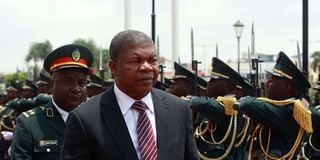Premium
Angola's opposition party files motion to impeach president

Angola's President Joao Lourenco (C) reviews the guard of honour as he arrives at the Angola Nation Assembly on October 16, 2017.
What you need to know:
- The initiative was publicly announced in July, but only on Thursday did Unita state its reasons for impeachment in a 100-page document signed by all 90 of its MPs
- The document contains 200 petitions, more than 200 pieces of evidence and 40 citizens as witnesses in support of Unita
- The speaker of parliament has called an extraordinary session for Friday to analyse the opposition's petition
Angola's main opposition party, the National Union for the Total Independence of Angola (Unita), filed a motion in parliament on Thursday to begin proceedings to remove President João Lourenço from office.
The initiative was publicly announced in July, but only on Thursday did Unita state its reasons for impeachment in a 100-page document signed by all 90 of its MPs.
The document contains 200 petitions, more than 200 pieces of evidence and 40 citizens as witnesses in support of Unita.
Unita accuses President Lourenço of being responsible for food shortages, unemployment and the arrest of demonstrators, and of being authoritarian.
The speaker of parliament has called an extraordinary session for Friday to analyse the opposition's petition.
Unita's parliamentary leader said the next step was for the courts to verify the legality of the actions.
"The court will verify the legality of the process, [but] it is parliament that will remove the President," said Mr Liberty Chiaka, adding that with this process, “Angolan democracy will free itself from the bonds of authoritarianism and will consolidate the democratic state and the rule of law."
“Angola will never be the same [again].”
The opposition has rejected accusations that the process to impeach President Lourenço is a coup attempt.
President Lourenço, 69, and his ruling Popular Movement for the Liberation of Angola (MPLA) won a disputed election last year with 124 seats in parliament, but Unita doubled the number of seats it won in the 2017 election.
The impeachment initiative has been met with some skepticism in the country because of the MPLA's parliamentary majority. An impeachment requires a two-thirds majority or more of sitting MPs to pass. This has never happened in Angola, mainly because the MPLA has always been the majority party and because Angola spent more than three decades after independence in civil war.
Nevertheless, it's now up to the President of the National Assembly to take the next steps in the process.
This is not the first time that the opposition has expressed its desire to remove President Lourenço from office.
In August, thousands of people rallied in Angola to call for his ouster in an event organised by Unita to commemorate its late leader.
In June, the oil-rich southern African country was hit by a wave of protests after the government cut petrol subsidies.
Analysts have differing views on the impeachment process.
Rosado de Carvalho, a local political analyst, told a local radio station that he believes Angola is now entering a different phase of its democracy and that the ruling MPLA will test its popularity and willingness to obey the constitution.
But a professor in Luanda told The Nation that he thought Unita was wasting its time because the government machinery was likely to come down hard on the masterminds. He asked not to be named because he teaches at a public university and fears government reprisals.




